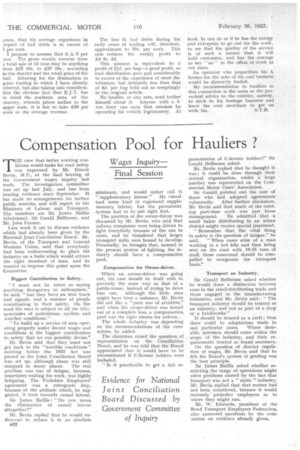Compensation Pool for Hauliers ?
Page 56

If you've noticed an error in this article please click here to report it so we can fix it.
Wages Inquiry— Final Session T. HE view that better working con4itions would make for road safety was expressed by Mr. Ernest Bevin, M.P., at the final hearing of the Government wages inquiry last week. The investigation committee was set up last July, and has been hearing evidence since September. It has made no arrangements for further public sessions, and will report to the Ministers of Labour and Transport. The members are Sir James Baillie (chairman), Sir Gerald Bellhouse, and Mr. John Forster.
Last week it sat to discuss evidence which had already been given by the National Joint Conciliation Board. Mr. Bevin, of the Transport and General Workers Union, said that everybody had been endeavouring to place the industry cm a baks which would attract the right standard of man, and he wanted to impress this point upon the Committee.
Biggest Contribution to Safety.
" I must not be taken as saying anything derogatory to railwaymen," he said, "but they have an iron track and signals, and a number of people contributing to their safety. On the road the man is subject to all the idiosyncrasies of pedestrians, cyclists and weather conditions."
"To build up a service of men operating properly under decent wages and conditions is the biggest contribution to safety that we can possibly devise."
Mr. Bevin said that they must not get back to the "horrible conditions" existing before the 1923 Act was passed or the Joint Conciliation Board was set up, although chaos was still rampant in many places. The real problem was one of fatigue, because, sometimes waiting for work, was highly fatiguing. The Yorkshire Employers' agreement was a retrograde step, because of the attitude which, he saggeqed, it took towards casual labour,
Sir James Baillie: "Do you mean the elimination of casual labour altogether?"
Mr. Bevin replied that he would endeavour to reduce it to an absolute B22 minimum, and would rather call it " supplementary labour." He visualized some kind of registered supplementary labour, but the permanent system had to be put right first.
The position of the owner-driver was discussed by Mr. Sevin, who said that railway companies were being driven to fight everybody because of the cut in rates, and he visualized that largez transport units were bound to develop. Personally, he thought that, instead of the present system of fighting, the industry should have a compensation pool.
Compensation for Owner-driver.
Where an owner-driver was going out, his case should be dealt with in precisely the same way as that of a public-house, instead of trying to drive him out. Although the little man might have been a nuisance, Mr. Bevin did not like a "pure war of attrition," and when the owner-driver was forced out at a complete loss, a compensation pool was the right means for redress..
The whole industry was depending on the recommendations of the committee, he added.
The chairman raised the question of representation on the Conciliation Board, and he was told that the Board appreciated that it would have to be reconstituted if C-licence holders were included.
"Is it practicable to get a fair re presentation of C-licence holders?" Sir Gerald Bellhouse asked.
Mr. Bevin replied that he thought it was; it could be done through their central organization, whilst a large number was represented on the Commercial Motor Users' Association.
Sir Gerald pointed out the case of those who had adopted agreements voluntarily. After further discussion, Mr. Bevin said that much of the existing part-time work was just loose management. He admitted that a small baker distributing in an urban district might receive special treatment.
"Remember that the vital thing in safety is the question of fatigue," he said. "When cases arise of a man working in a hot kiln and then being sent on the road with 10-15 tons of stuff, those concerned should be compelled to reorganize the transport basis."
Transport an Industry.
Sir Gerald Bellhouse asked whether he would . draw a distinction between vans in the retail-distributing trade and those engaged in the manufacturing industries, and Mr. Bevin said : "The transport industry should be treated as an industry, and not as part of a shop or a brickworks."
It should be treated as a craft; then there could be adaptations made to suit particular cases. Where desirable, salesmen should come within the scope of the industry, and their requirements treated as found necessary.
On the question of district regulation of wages, Mr. Bevin said that he felt the Board's system of grading was the best principle.
Sir James Baillie asked whether restricting the range of operations might solve problems caused by the fact that transport was not a "static "industry. Mr. Bevin replied that that matter had not been considered, because it would seriously, prejudice employers as to where they might run.
Mr. W. Edwards, president of the Road Transport Employers Federation, also answered questions by the committee on evidence already given.




























































































